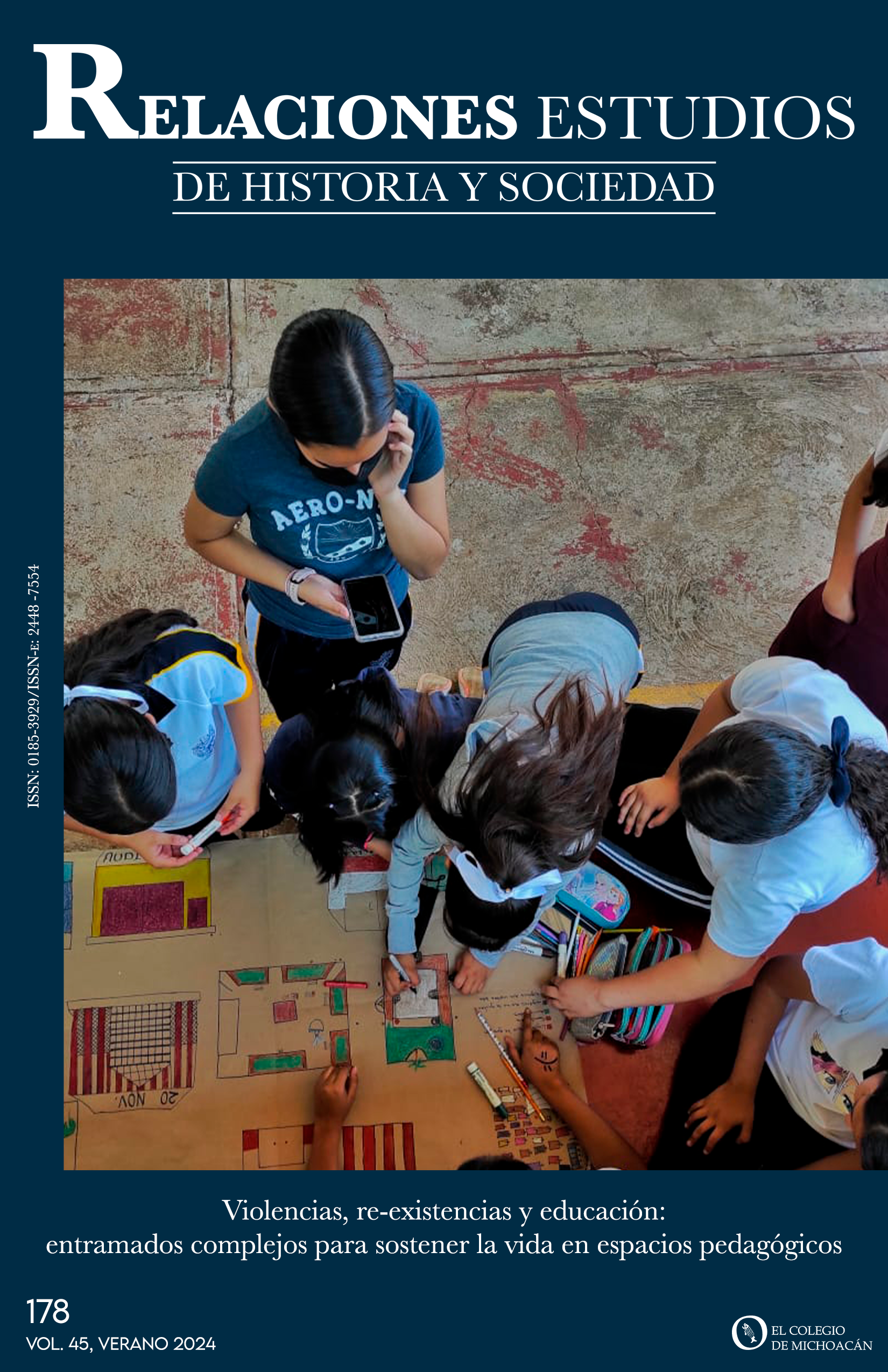Participatory workshop for the co-construction of peace in contexts of violence by organized crime
DOI:
https://doi.org/10.24901/rehs.v45i178.1023Keywords:
violence, organized crime, peace education, Participatory Action Research, workshops (teaching method)Abstract
The participatory workshop that is presented arises as part of the participatory action research method, of a larger study under the critical paradigm and qualitative approach. It was carried out with girls and boys from three communities in the Tierra Caliente Region in the state of Michoacan, Mexico, located in contexts of high violence due to organized crime. Participatory action research involves a series of phases, the most important, the action. It is precisely in this where the design, application and assessment of the proposal described here is positioned. The objective is to present the systematization of the experience of the participatory workshop with the smell of lemon green. The workshop as a whole allowed to direct the participants in the search for autonomy, reflective and democratic participation. The investigation allows us to conclude that interventions of this nature are a tool that contributes to the construction of conditions that allow the emergence of a culture of peace, integrating the knowledge of those involved.
References
ARBOLEDA, Z., HERRERA, M. y PRADA, M. (2017). ¿Qué es educar y formar para la paz y cómo hacerlo? Educación y pedagogía para la paz-Material para la práctica. ARKO.
BISQUERRA, R. (2012). Metodología de la investigación educativa. La Muralla.
COLMENARES, E. (2012). Investigación-acción participativa: una metodología integradora del conocimiento y la acción. Voces y Silencios: Revista Latinoamericana de Educación, 3(1), 102-11. https://dialnet.unirioja.es/descarga/articulo/4054232.pdf
FALS-BORDA, O. (1999). Orígenes universales y retos actuales de la IAP. Análisis Político, (38), 73-90. https://revistas.unal.edu.co/index.php/anpol/article/view/79283/70535
GHISO, A. (1999). Acercamientos: el taller en procesos de investigación interactivos. Estudios sobre las Culturas Contemporáneas, 1(9), 141-153. https://www.redalyc.org/articulo.oa?id=31600907
GRAHAM, A., POWELL, M., TAYLOR, N., ANDERSON, D. y FITZGERALD, R. (2013). Investigación ética con niños. UNICEF-Innocenti.
HERRERO, R. (2012). La Educación para la paz desde la filosofía para hacer las paces: el enfoque REM [Tesis de Doctorado]. Instituto Interuniversitario de Desarrollo Social y Paz.
JARA, O. (2014). La sistematización de experiencias, práctica y teoría para otros mundos posibles. Alforja, CEAAL, Intermon Oxfam.
LOAIZA, J., OSHEA, H. y RAMÍREZ-LÓPEZ, C. (2015). Socialización política y construcción de paz: una lectura en clave de educación popular. En R. Unda., L. Mayer. y D. Llanos (Coords.), Socialización escolar. Procesos, experiencias y trayectos (pp. 123-150). Abya-Yala.
MELERO, N. (2012). El paradigma crítico y los aportes de la investigación acción participativa en la transformación de la realidad social: un análisis desde las ciencias sociales. Cuestiones Pedagógicas, 21, 339-355. https://idus.us.es/bitstream/handle/11441/12861/file_1.pdf?sequence=1&isAllowed=y
OSPINA, J. (2010). La educación para la paz como propuesta ético-política de emancipación democracia. Origen, fundamentos y contenidos. Universitas, 11(1), 93-125.
RAMOS, C. (2015). Los paradigmas de la investigación científica. Unife, 23(1), 9-17. http://www.unife.edu.pe/publicaciones/revistas/psicologia/2015_1/Carlos_Ramos.pdf
SALGUERO, J. (2004). Educar para la paz. El caso de un país dominado por la violencia: Colombia [Tesis de Doctorado]. Universidad Complutense de Madrid. http://biblioteca.ucm.es/tesis/edu/ucm-t27290.pdf
VARGAS-GARDUÑO, M., VARGAS-SILVA, A. y MÉNDEZ-PUGA, A. (2017). Procesos de construcción de subjetividad en la niñez y la adolescencia: aportes desde la investigación cualitativa. Ciencia Nicolaita, (69), 48-60.
Published
Issue
Section
License
Copyright (c) 2024 María de Jesús Pasallo Zepeda

This work is licensed under a Creative Commons Attribution-NonCommercial 4.0 International License.
Derecho de los autoresDe acuerdo con la legislación vigente de Derechos de Autor, la revista Relaciones Estudios de Historia y Sociedad reconoce y respeta el derecho moral de los autores, así como la titularidad del derecho patrimonial, el cual será transferido –de forma no exclusiva– a la revista para permitir su difusión legal en Acceso Abierto.
Los autores pueden realizar otros acuerdos contractuales independientes y adicionales para la distribución no exclusiva de la versión del artículo publicado (por ejemplo, incluirlo en un repositorio institucional o darlo a conocer en otros medios en papel o electrónicos), siempre que se indique clara y explícitamente que el trabajo se publicó por primera vez en la revista Relaciones Estudios de Historia y Sociedad.
Para todo lo anterior, los autores deben remitir la carta de transmisión de derechos patrimoniales de la primera publicación, debidamente requisitada y firmado. Este formato debe ser remitido en PDF a través de la plataforma OJS.
Derechos de los lectores
Bajo los principios de Acceso Abierto los lectores la revista tienen derecho a la libre lectura, impresión y distribución de los contenidos de la revista por cualquier medio, de manera inmediata a su publicación en línea. El único requisito para esto es que siempre se indique clara y explícitamente que el trabajo se publicó por primera vez en la revista Relaciones Estudios de Historia y Sociedad y se cite de manera correcta la fuente y el DOI correspondiente.















